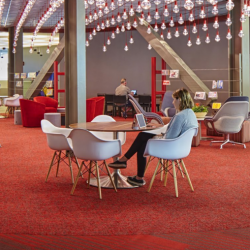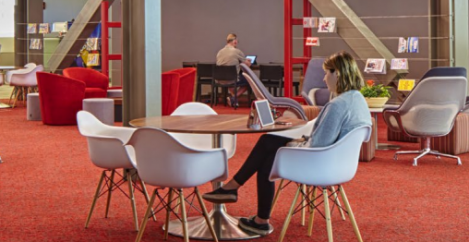October 22, 2020
The enduring appeal of the office to global employees
 Tarkett, a provider of innovative flooring and sports surface solutions, has released the findings of the first of three Rethinking Workplace Surveys, which it is undertaking in collaboration with WKSpace. Questioning global office workers on their perceptions and experience of work and the office, the Rethinking Workplace Surveys will provide valuable insights into how best practice workplace design must adapt to the dramatic impact of the Covid-19 pandemic.
Tarkett, a provider of innovative flooring and sports surface solutions, has released the findings of the first of three Rethinking Workplace Surveys, which it is undertaking in collaboration with WKSpace. Questioning global office workers on their perceptions and experience of work and the office, the Rethinking Workplace Surveys will provide valuable insights into how best practice workplace design must adapt to the dramatic impact of the Covid-19 pandemic.
Run in June 2020, the first survey has gathered and analysed the views of 2,800 global office workers, counting 200 respondents each from Australia, Belgium, China, Czech Republic, Denmark, France, Germany, Netherlands, Italy, Poland, Romania, Sweden, UK, USA.
Commenting on the survey findings, Anette Timmer, Workplace Segment Marketing Director, Tarkett EMEA, said: “The results from our first Rethinking Workplace Survey during the Covid-19 pandemic challenge certain views on the demise of the office. Instead, what has been brought into sharp focus by months of enforced home working is the vital role and value of the office as a hub for collaboration. This series of three surveys is a unique piece of research within our industry which we believe will be highly beneficial to clients and designers as they move quickly to deliver productive and enriching working environments in a period of unprecedented change.”
Highlights
A majority of respondents said they were most productive in the office. There was a uplift here compared to the pre-pandemic surveys, suggesting that after being forced to work from home full-time, office workers now see the value of the office environment.
• 87 percent of European respondents believe they are most efficient in their workplace (90 percent+ in Australia, the USA and China)
• There was a 38 percent increase in US respondents who now believe they are most productive in the office versus the pre Covid-19 results, and a 25 percent increase in the UK and Australia.
The vast majority of the people surveyed see the convergence between home and work life as a positive. The pandemic seems to have particularly shifted Europeans’ opinions, almost bringing them in line with their peers in Australia and the US, where flexible working has been the norm long before Covid-19.
However, the British seem to be feeling the strain of lockdown, with the percentage of people feeling that the overlap goes “too far” and that they “can rarely switch off” has nearly doubled since Covid-19.
• 79 percent of European office workers see the convergence of home and work life as a positive versus 53 percent pre-Covid
• 25 percent of UK office workers now feel that the overlap between work and home life goes “too far” and that they “can rarely switch off” (this has increased from 13 percent pre-Covid)
• 81 percent of office workers in China see the convergence between work and home life as a positive and 51 percent say that their work life doesn’t overlap with their free time.
Insights
• The office is essential. The majority of respondents believe that they are most productive in the office – and this trend has actually increased post Covid-19. However, the function of the office has changed: the focus should now be on creating an ‘experience’ to accommodate different ways of working.
• Collaboration and face-to-face teamwork is key. Office workers all over the world seem to have missed working together face-to-face: they now want a workspace that enables them to come together and collaborate.
• The office should be different from home. When it comes to style, office workers want their workspace to reflect the culture of the business with corporate and ‘bright & fun’ settings growing in popularity since the pandemic.
• Indoor air quality is now a key concern. Respondents were very split on what worried them the most about their workplace, however, taken as a whole, indoor air quality nudged ahead and office workers seem less bothered about office noise than before Covid-19.
• ‘Flexibility’ is still king. Workers want greater flexibility in all areas of their work life, from working hours through to working environment. Designers need to tailor their schemes to suit a variety of individual needs and ways of working.
• Social consciousness is rising. The pandemic has accelerated social activism around wellbeing, sustainability and social change. Now, more than ever, workplace designers need to bring these factors into consideration.
















